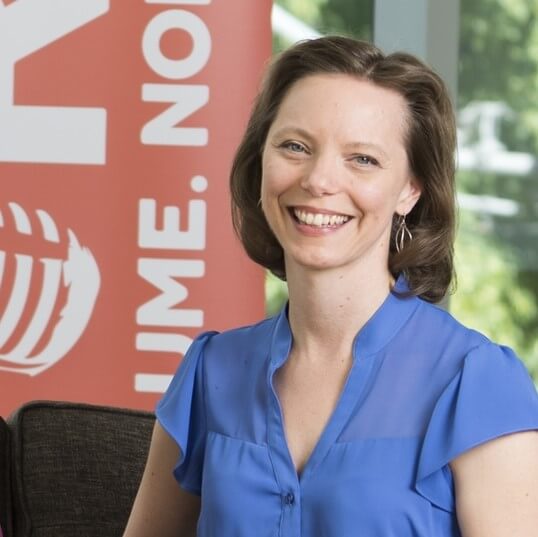The #1 Skill for Nailing Your Interview

Rachel Beohm is a nonverbal communications coach and trainer for FORTE, a consulting firm located in Portland, Oregon,
Few things in life are as nerve-wracking as The Job Interview. It’s almost worse than a blind date! You have a general idea of the protocol, but even if you do your research, you can’t predict how things will go when you walk through the door.
Understandably, we get nervous. I recently coached a client who had a big interview coming up for a job that seemed perfect with a large local company. She had been in business for herself and missed the camaraderie of working with a team. I asked her about the upcoming interview and immediately her whole body tensed up, her voice tone thinned, and her foot tapped fretfully. Her nervousness was palpable. And it was affecting every aspect of her nonverbal communication and her presence.
Most people desperately want to make a good first impression; but in their anxiousness to do so, they undermine their efforts! There’s nothing wrong with a little adrenaline to give you a bit of an energy bump for an interview, but to present yourself as a competent, credible, capable candidate, you must get your nerves under control.


Take a few moments to bring your attention to your breath. Notice whether it’s quick or full, shallow or deep.
RACHEL BEOHM
How do you do that? Here is one very simple, yet important, tip: Breathe. It’s likely that you already (perhaps instinctively) know to breathe when you’re nervous. But do you know why? Here are three ways that practicing deep, conscious breathing helps you nail your interview:
You can THINK.
When you’re in fight-or-flight, your brain doesn’t think—it reacts. Have you ever thought you saw something threatening out of the corner of your eye and jumped, only to discover it was nothing? When you sense danger, your brain doesn’t take the time to rationally analyze the data and come up with a cogent response. It jumps! It actually reroutes your oxygen directly to the limbic system (the instinctive part of the brain) and bypasses the prefrontal cortex (the part of the brain responsible for rational, logical thought).
That’s terrific when you’re hiking and about to step on a poisonous snake! Jump! It’s not so great when you’re in an interview and you can’t string two words together or form a complete thought. Thankfully, your life is not actually in danger in a job interview, so you can override your fight-or-flight response. You do that by deep breathing. Then you can access your experience and education and sounds like you know what you’re talking about.
A friend recently had a job opportunity pop up out of the blue. “I haven’t been on an interview in almost a decade!” he told me. “I’m out of practice.”
“Nah,” I said. “You have 40 years of preparation. All your education, experience, knowledge, and training are all there. You just need to access them. Breathe.”
You sound CONFIDENT.
Your body breathes more shallowly during fight-or-flight, and that shallow breathing affects every part of your body: your movements become jerky instead of fluid, your voice sounds edgy instead of warm, your eyes dart around instead of maintaining eye contact, and on and on it goes. That lets everyone know loud and clear, “I FEEL THREATENED!”
If you can’t handle the stress of a job interview, how are you going to handle the demands of your job? When you breathe deeply, you send the message that you are up to the task at hand. You can handle it. You communicate that you are not threatened, and that sends your credibility through the roof. You don’t want to come across as blasé or arrogant, of course; but by breathing well you are saying, “I’ve got this. I can do it.”
You create a safe PRESENCE.
Breathing patterns are contagious. We take our breathing cues from the person speaking. When my client came in for interview coaching, my first hint that she wasn’t breathing well weren’t all the physical signs she demonstrated: the tense body, thin voice, or tapping foot. What I noticed first was that I felt uncomfortable.
The last thing you want to do in an interview is make everyone ELSE nervous! If your very presence causes agitation and tension, that doesn’t give a very good impression. No, you want to set yourself up as the answer to the problems, the one who will make things better. You want people to feel comfortable and safe in your presence. Once again, you do that by breathing.
It didn’t take long for my client to realize that she was holding her breath and communicating anxiety and apprehension. We spent a good deal of her session practicing breathing, opening up her posture so that she could breathe more deeply, and letting go of her fears around how the interview might go. By the end of the session she was a different person—one who looked, sounded, and felt competent, confident, and credible.
You can do this, too. Take a few moments to bring your attention to your breath. Notice whether it’s quick or full, shallow or deep. Gradually, deepen your breath so that your entire abdomen expands and contracts. Notice how it relaxes your muscles, deepens your voice, and clears your head.
The next time you are preparing for an interview, presentation, or any kind of nerve-wracking ordeal (blind date, perhaps?) take a few minutes to breathe. You’ll be able to think more clearly, you’ll look and sound more confident, and everyone around you will feel more comfortable.

CAREER ADVICE

GOV TALK




